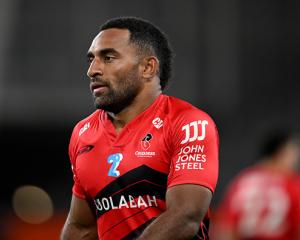As the World Cup prepares to kick off, ODT Online rugby writer Jeff Cheshire considers the All Blacks' chances of defending the trophy.
Don't go in with expectations
World Cups are never foregone conclusions no matter how dominant one team might look in the lead-up. While the All Blacks have lost just three games in the last four years, and they no doubt enter as favourites, once the tournament is under way that means little.
Many times the All Blacks have gone into the Cup as red-hot favourites and either under-performed or fallen to a one-off inspired opponent. You cannot underestimate that inspiration factor. Teams get up for the World Cup and they get up to play the All Blacks.
McCaw's men are not that far ahead of the next best teams. On their day South Africa, England, Ireland, Australia and France are all capable of knocking them over, and chances are they will come up against three of them in must-win games if they make it that far.
Can they do it? Yes of course they can, but there is no easy route to the title and if the All Blacks do not win, it should not come as a shock.
The ability to win games
In the past few years the All Blacks have nearly always found a way to win, even when they have not played well, or have seemed a little off the pace. That is a skill, and it is something they have lacked in the past.
Of course having the basic fundamentals is important. But so is being able to sum up a situation, sometimes mid-game, and figure out what they need to be doing to beat a given opposition in the conditions they are playing in.
Can anyone match their firepower?
World Cup knockout games are generally tight affairs but it does not mean that you cannot win one by playing a more open game.
The All Blacks have flair and firepower to burn in the backline. In choosing newcomers Waisake Naholo and Nehe Milner-Skudder, the selectors have clearly sent their intention to make that spark a point of difference, while there is X-factor in abundance elsewhere too. We have seen time and again that on a dry track and with front-foot ball, they can be near impossible to contain. It is not just the backs either, with the majority of the forward pack capable of running and passing in the open, giving this team so many more threats on attack.
The fitness factor
How often over the past few years have we seen teams stick with the All Blacks for 60 minutes, only to get run all over in the final quarter of the game? It has become a trend and whenever the All Blacks seem to be in a scrap, the old saying "last 20 minutes" can indeed be reassuring.
For whatever reason, teams just cannot match their level of fitness, struggling to keep up with the pace they play the game at for a full 80 minutes. It is dangerous to rely too much on that though, particularly if turns out that the other team in fact can stick with them.
Will an easier pool hurt them?
The All Blacks drew the most straightforward pool and it would be a surprise if they did not win it with relative ease. However, that is not always a good thing. Sometimes playing too many easy games creates bad habits. Often minnows struggle to keep up with the pace the top teams play the game at and get lost on defence when their opponents attack with speed and width.
That means the top teams can get by without having to manipulate the defence to create chances, as the defence is normally flimsy enough as it is. The problem with that is that when you go back to playing against teams with tougher defences, it can be easy to try to continue in this manner. But it doesn't work. When it comes to playing the top teams, you have to build pressure and think ahead to create gaps by playing a certain type of game. The physicality and pace the opposition plays at becomes a step up too.
For the All Blacks the important thing will be to not get into bad habits during the pool stages and if they do, break them as quickly as they created them. Given the other pools all have three tier one nations, this is something that is more likely to suck the All Blacks in than anyone else.
What type of game will they play?
It is hard to pin-point the exact tactics the All Blacks will use during the World Cup. For most of the past four years their most obvious plan has been to try to create gaps through using the short ball from the first receiver, normally a forward, to a forward runner. But it never really looked convincing and as teams caught on to it, they began to shut it down with ease.
In their last game, against the Wallabies, they strayed from this and used a more conventional strategy of forward runners crashing it up, holding for more phases and then exploiting gaps created through pressure. Do not be surprised to see them use a bit of both to keep opponents guessing. They have the players to play an expansive game, while also possessing a pack that can excel in a tight scrap.
Taking each game as it comes and playing what is in front of them will surely be the best way forward.
Will goal-kicking be an issue?
Having a good kicker is almost a prerequisite. The best ones will make in excess of 70% and in tight games, missing three or four kicks can be the difference between a win and a loss. Along with scoring tries, that is what is meant by turning the hard work of the team into points.
Whether the All Blacks have taken the best options for this is questionable. Dan Carter has been there and done that but has not been as consistent in recent times, Colin Slade can blow hot and cold, while Beauden Barrett has not convinced since returning from injury.
You get the sense that the best kicking option, Lima Sopoaga, has been left at home and on the back of that, you would not want an off day with the boot to come back and haunt the All Blacks.
How to defend a World Cup
Ominously for the All Blacks, no one has ever successfully defended the World Cup. Just why it has proven so hard can not be put down to one reason.
The most obvious thing to point to is that it is hard to maintain a period of dominance over five years. It is short enough that you are probably going to have a lot of the same players involved, but it is long enough that it is going to be hard for them to be at their peak at either end of the period. A lot of teams have been reluctant to change their winning formula, then been tripped up when it eventuates that the players just are not good enough to keep doing what they were doing.
Staying in the moment and being adaptable is going to be key for the All Blacks. If that means dropping old heads who were there in 2011, then so be it. Choosing Milner-Skudder and Naholo over Israel Dagg and Cory Jane is a sign that they are prepared to do this, both from a personnel perspective and a tactical one.
On the other hand, experience is not a bad thing either, hence the need to get the right mix to do the job. Steve Hansen has spoken about going there to win it, not defend it, and that seems like a good mindset.






!["It’s just one year [that Dunedin misses out]. There are opportunities again in the future for...](https://www.odt.co.nz/sites/default/files/styles/odt_landscape_small_related_stories/public/story/2025/12/gettyimages-1190749175-594x594.jpg?itok=jxN1B1bV)






